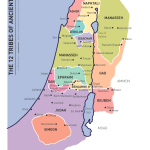I concluded yesterday’s contradiction (#307) with this thought: Finally, the author of Deuteronomy also informs us that Joshua was selected in Moses’ stead precisely because Moses too was not allowed to enter the promised land. The surprising thing here, is that if we look at the Deuteronomic tradition on its own terms, nowhere does it inform us that Joshua was granted access to the promised land because of his faith inRead More
Month: July 2015
#307. Did Moses already know about Joshua’s election as his successor OR not? (Deut 1:38 vs Num 27:15-17)
Numbers 27:15-23 introduces the election of Joshua as Moses’ successor for the first time, narratively speaking, in the Torah. Chronologically speaking it is presented as happening in one of the months in the last half of the 40th year of the wilderness period and coincides with Moses’ climb onto Abarim (but see #305) before he is to die so that he may see the land that he himself is refused accessRead More
#306. Does Moses implore Yahweh to let him crossover OR not? (Deut 3:23-28 vs Num 27:12-21)
Deuteronomy 1-11 presents Moses renarrating events from the wilderness period as a sort of survey of events leading up to the encampment on the plains of Moab some 40 years afterward. Yet in every single renarration the author of Deuteronomy has Moses alter, modify, and even contradict the details of these events/stories as they were told in the books of Exodus and Numbers. Most of these altered retellings happen to theRead More
#305. From which mountain does Moses view the promised land: Abarim OR Pisgah OR Nebo? (Num 27:12; Deut 32:49 vs Deut 3:27, 34:1 vs Deut 32:49, 34:1)
And Yahweh said to Moses: “Go up this mountain, Abarim” (Num 27:12 [P]) “Go up to the top of Pisgah” (Deut 3:27 [D]) “Go up this mountain Abarim, Mount Nebo” (Deut 32:49 [P or R]) “to the mountain of Nebo, to the top of Pisgah” (Deut 34:1 [D]) It looks as if there were differing traditions concerning the mountain Moses ascended and from where he was allowed to view the promisedRead More
#304. “Each tribe shall be granted his territory according to its numbers” OR not? (Num 26:54 vs Josh 13-19)

Numbers 26:54 specifically states that the size of land appointed to each tribe is to be determined by each tribe’s number: “To a larger group give a larger inheritance, and to a smaller group a smaller one. Each tribe is to receive its inheritance according to the number of those numbered among them.” But this is not what happens when the land is allotted in Judges 13-19. The largest tribe doesRead More
#303. The land is to be allotted according to the tribes enumerated in Numbers 26 OR only to 9½ of them? (Num 26:53 vs Num 34:13; Josh 13:7, 14-19)
Strictly speaking, Numbers 26:53 is not exactly correct. To the above shall the land be allotted as territories, in proportion to the number of names. The verse follows the census of the 12 tribes just enumerated in chapter 26 and foreshadows the allotment of the land. In fact, the verse is inaccurate on 2 counts: but the issue with the latter half of this verse and the next, I will postRead More
#300. Is Bechar Benjamin’s son OR Ephraim’s son? (Gen 46:21; 1 Chr 7:6 vs Num 26:35)
#301. Were Ard and Naaman sons of Benjamin OR sons of Benjamin’s son Bela? (Gen 46:21 vs Num 26:40)
#302. Are Benjamin’s 5 sons Bela, Ashbel, Ahiram, Shephupham, and Hupham OR Bela, Ashbel, Aharah, Nohah, and Rapha? (Num 26:38-39 vs 1 Chr 8:1-2)
The Priestly genealogy preserved in Numbers 26 serves as a book-end to the whole wilderness period where the first registry, narratively speaking, was recorded in the Priestly tradition of Genesis 46:8-27 (see #76). In comparing the two lists—which for the most part are similar—we notice nevertheless some minor discrepancies, most of which deal with different spellings for names, or missed or unlisted clans (specifically compare the clans listed for the Simeonite,Read More